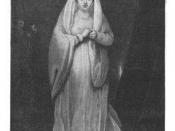"He who blinded by ambition, raises himself to a position whence he cannot mount higher, must thereafter fall with the greatest loss." - Niccolo Machiavelli. This preceding quote effectively describes Macbeth's fight to gain and maintain his role as King of Scotland. Throughout the play, Macbeth did anything necessary to become King. When he feared his reign was at risk, he again did whatever he thought was necessary to ensure his role. His ambitions caused him to take part in many regretful acts, resulting in havoc throughout Scotland. Later in the play, his prerequisite knowledge allowed him to fear nothing, which essentially caused him to lose his reign as King. The effects of Macbeth's ambition are: multiple deaths, his and Lady Macbeth's relentless feeling of guilt, and the change of Kingdom leaders.
The first most prominent effect of Macbeth's ambition is the murder of multiple people. The first person that is killed as an effect of Macbeth's ambition is King Duncan. Lady Macbeth convinces Macbeth that he will prosper if he kills Duncan. Therefore, under the forceful direction of Lady Macbeth, he murders Duncan for his own gain, even though he currently realizes that what he is doing is wrong. The result of his actions can be seen when he says: "I go, and it is done; the bell invites me. / Hear it not, Duncan; for it is a knell / That summons thee to heaven, or to hell." (II.i.62-64). Macbeth felt so strongly that he would become King that he decided to kill the current King of Scotland himself. The next person who is murdered as an effect of Macbeth's ambition is Banquo. Banquo voiced his suspicion over Macbeth's contribution to Duncan's murder, therefore, Macbeth felt Banquo was a threat to his reign as King, and...


